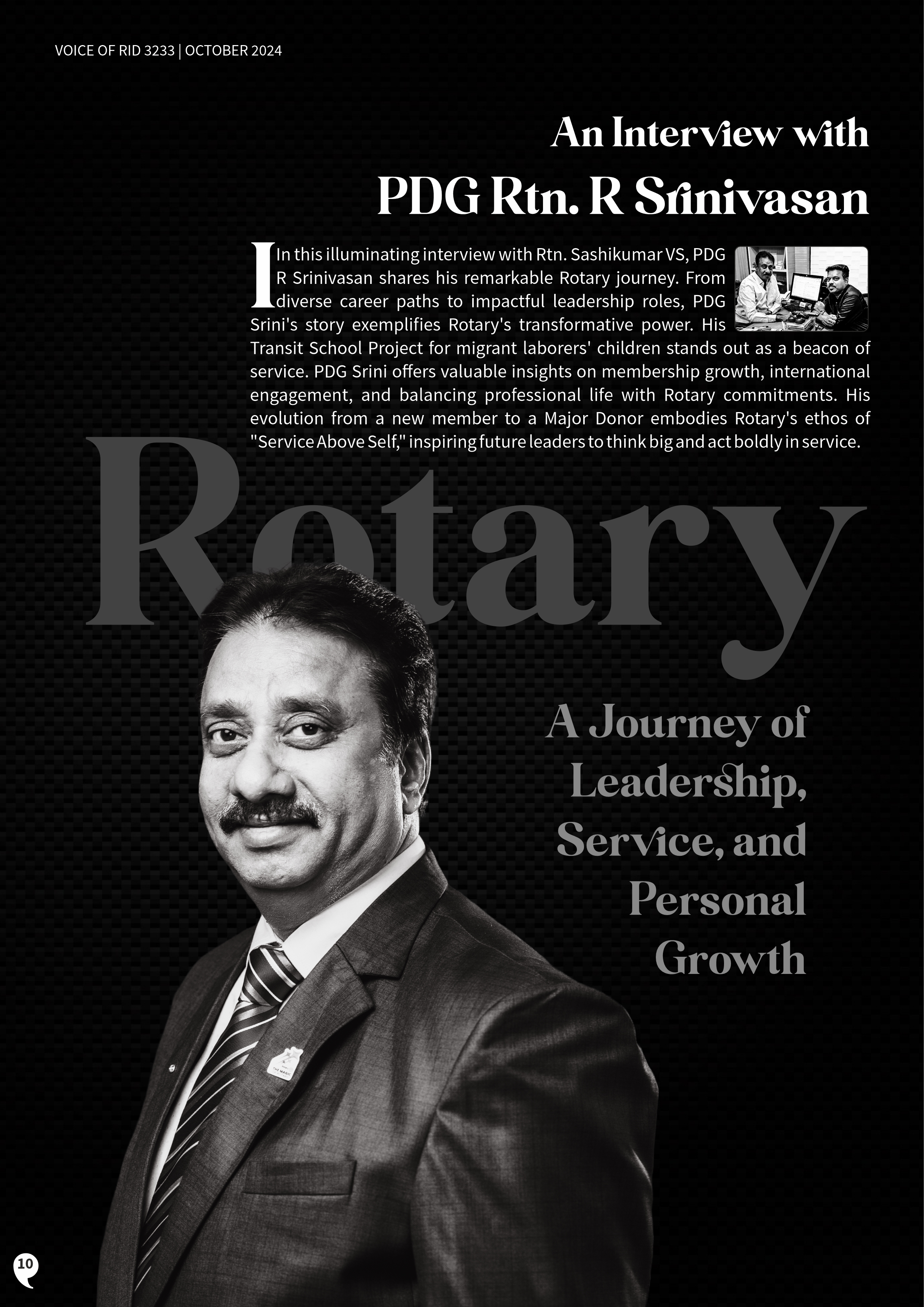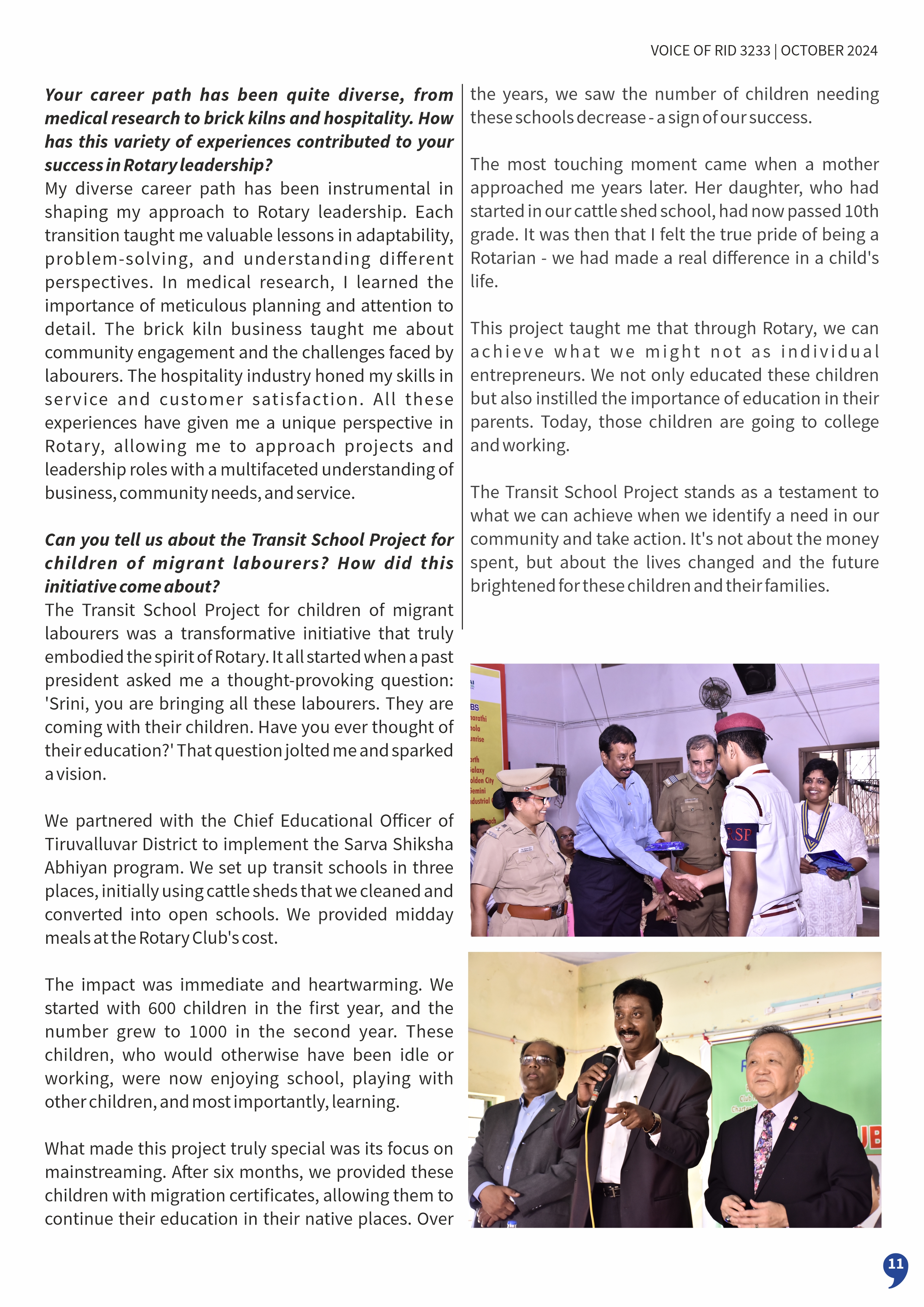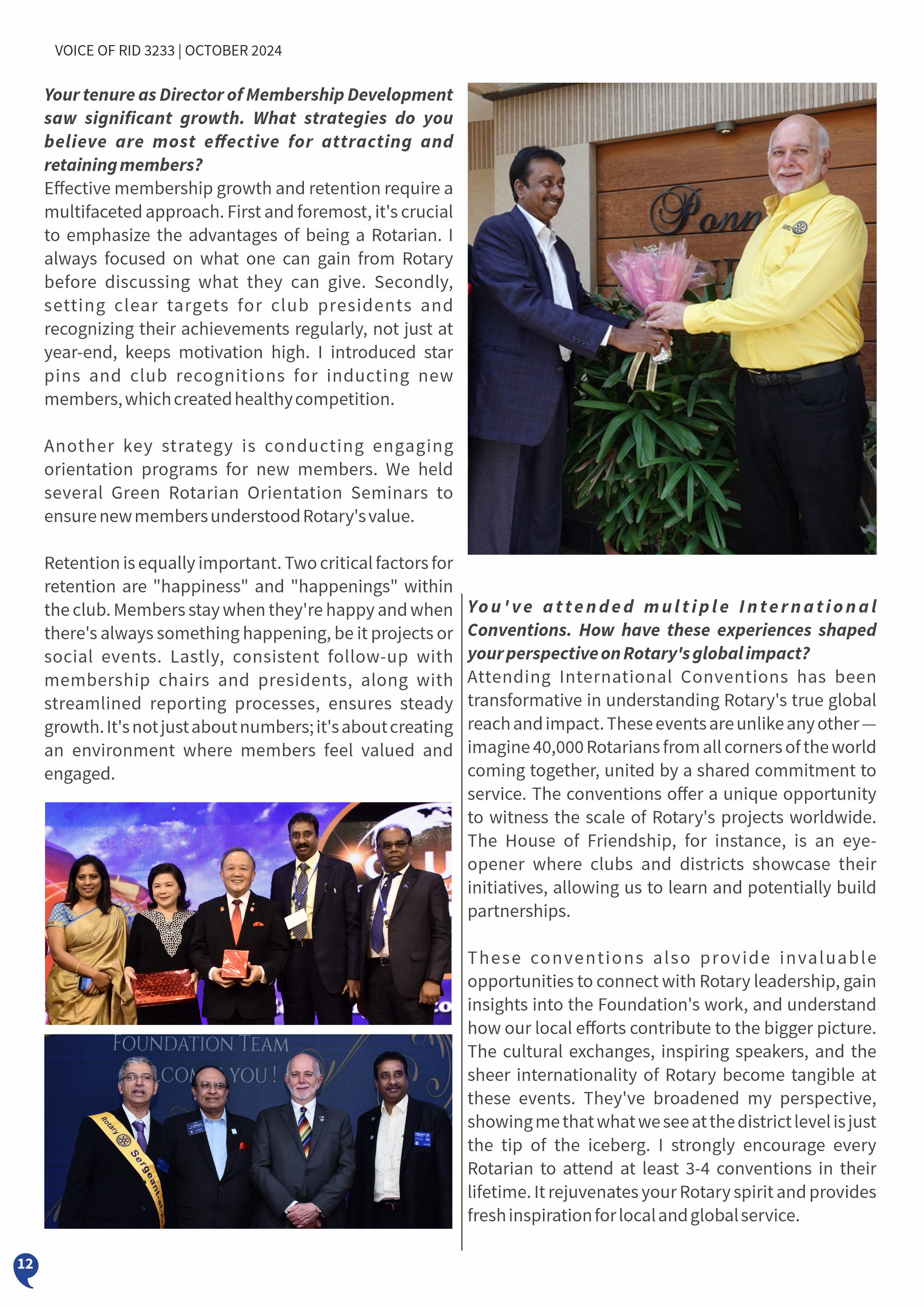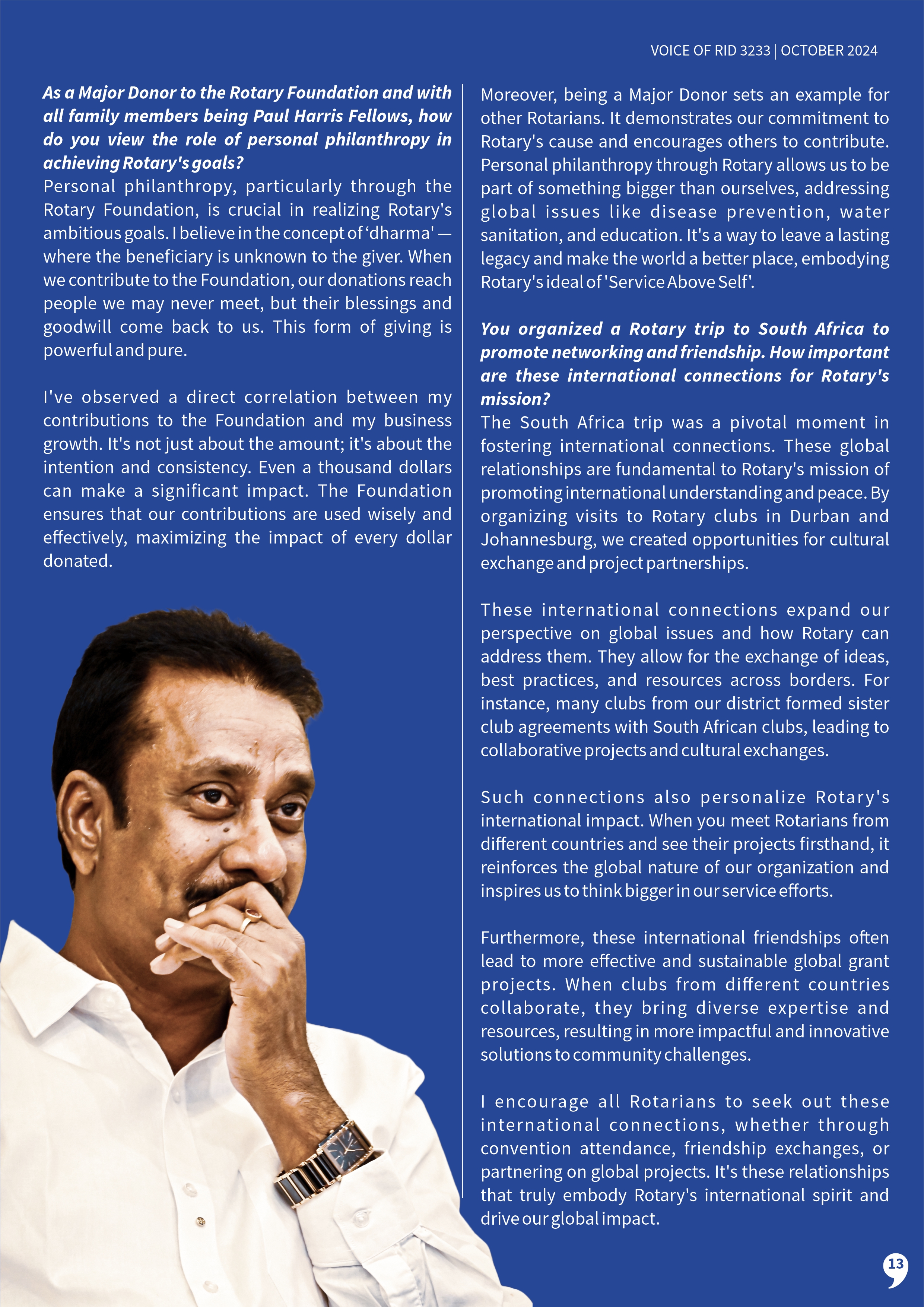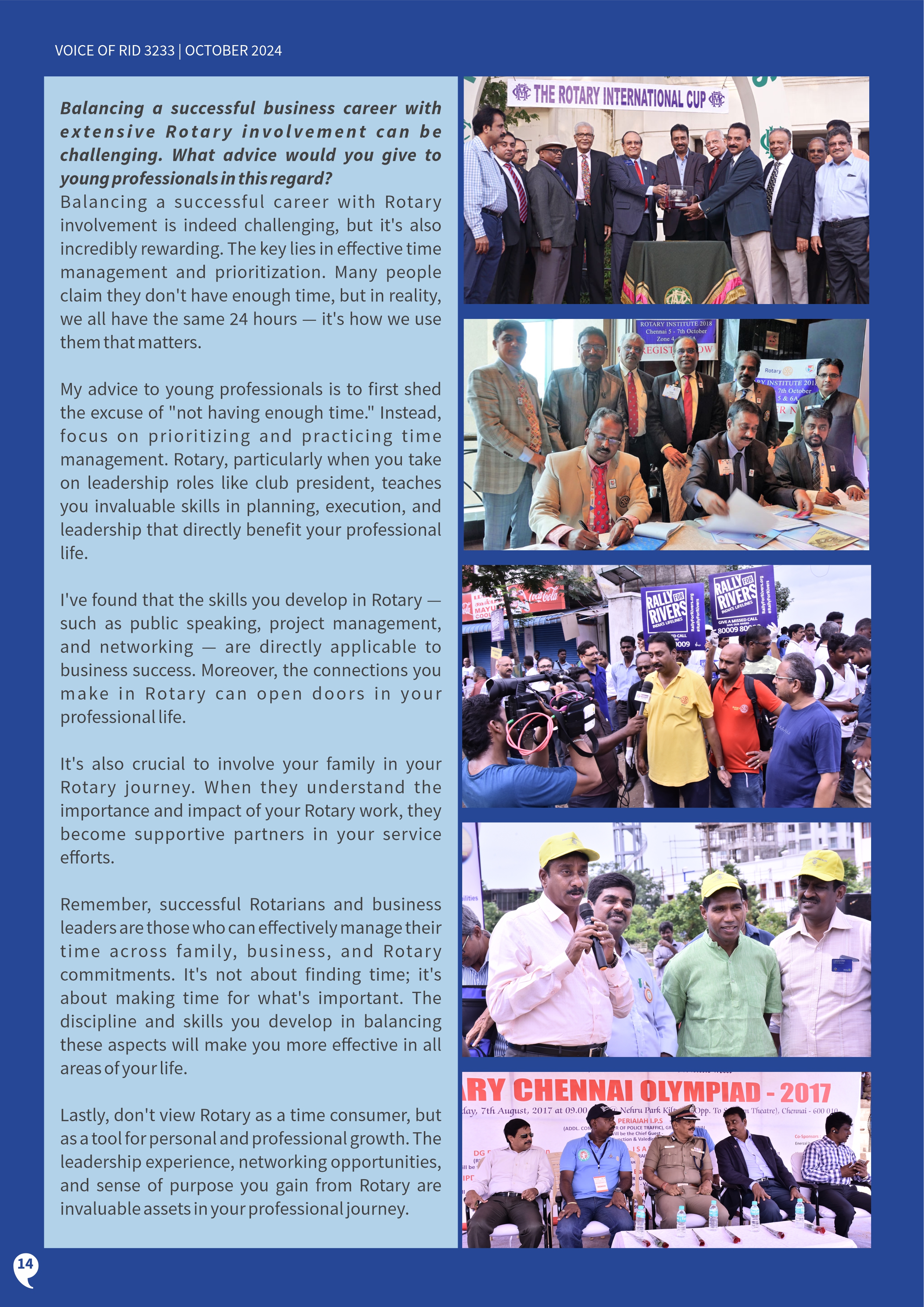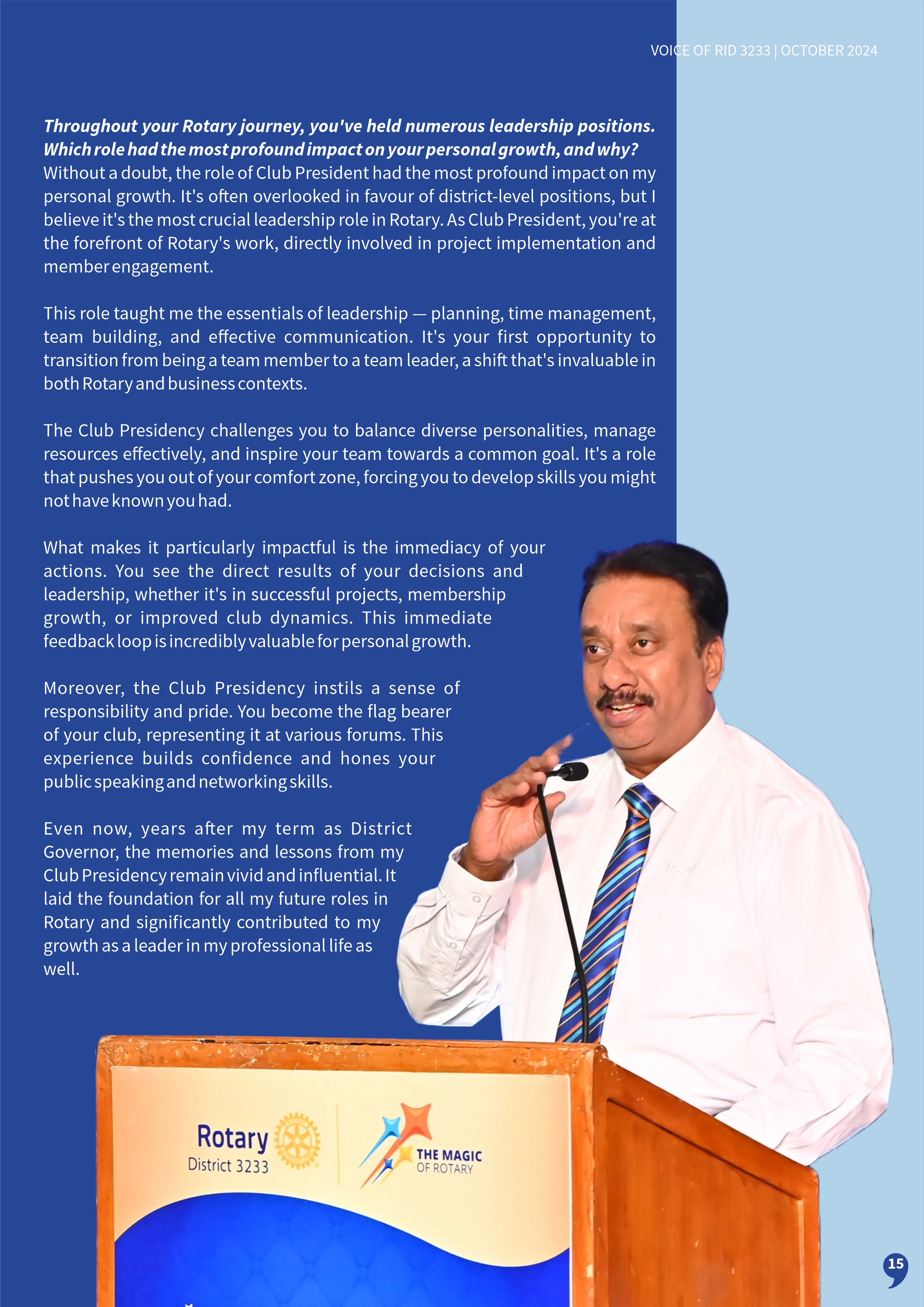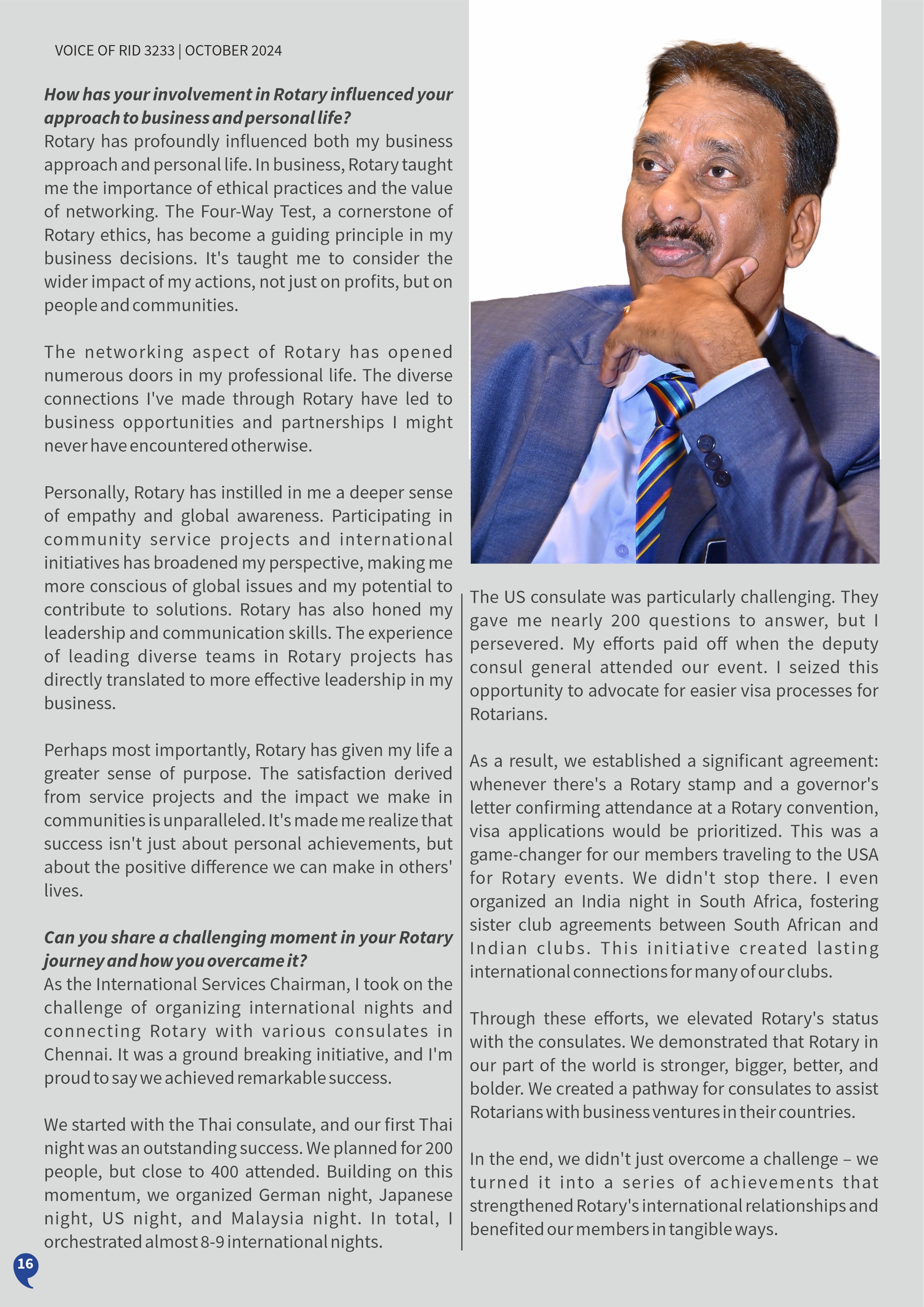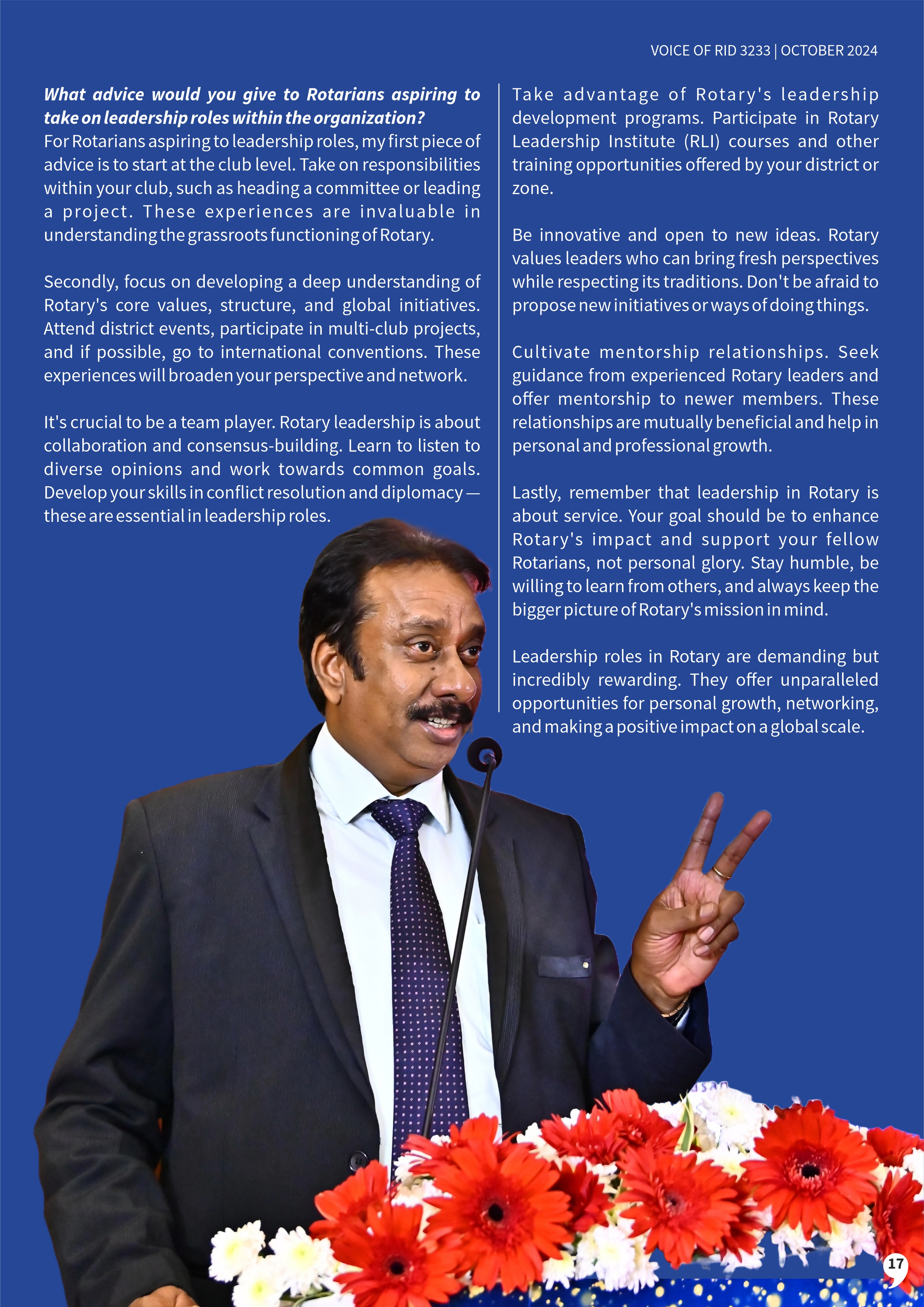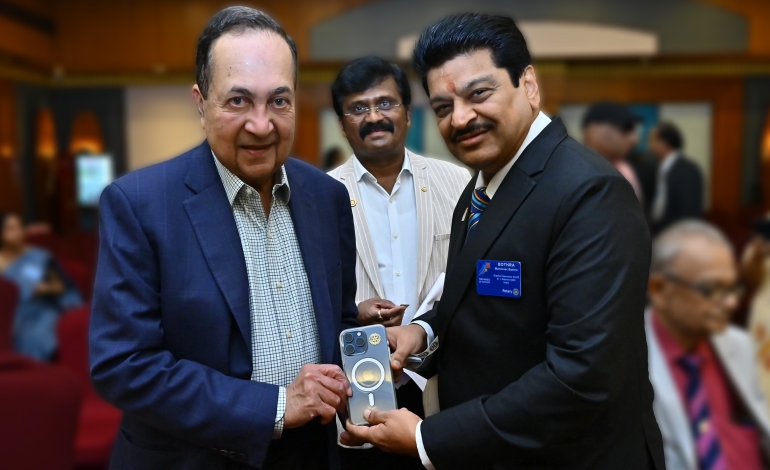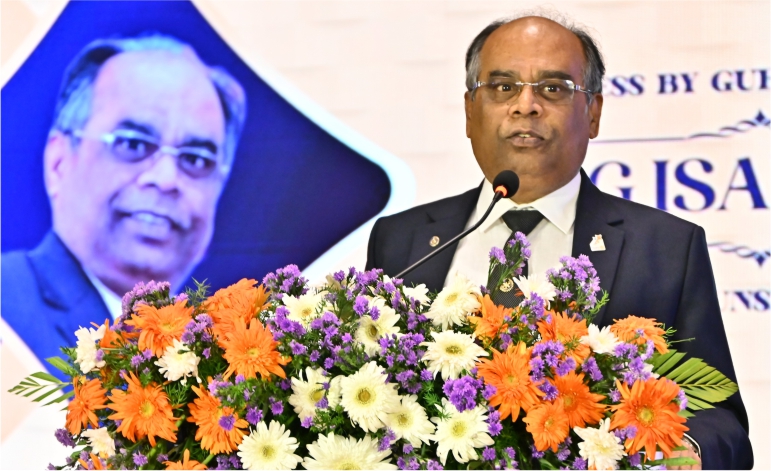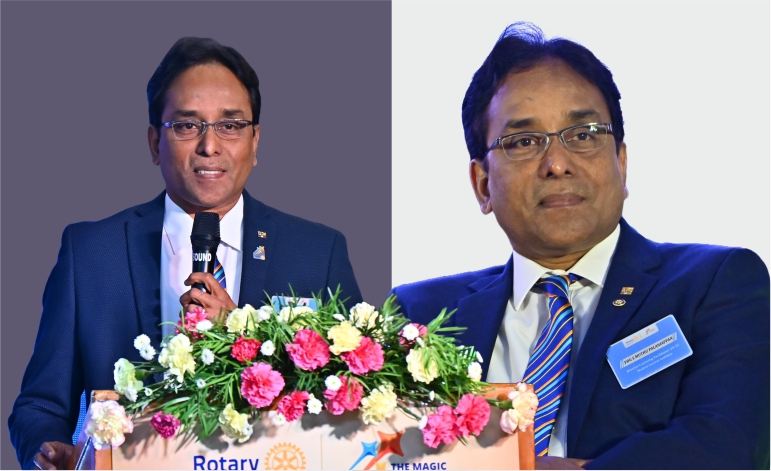Rotary: A Journey of Leadership, Service, and Personal Growth – An Interview with PDG Rtn. R Srinivasan
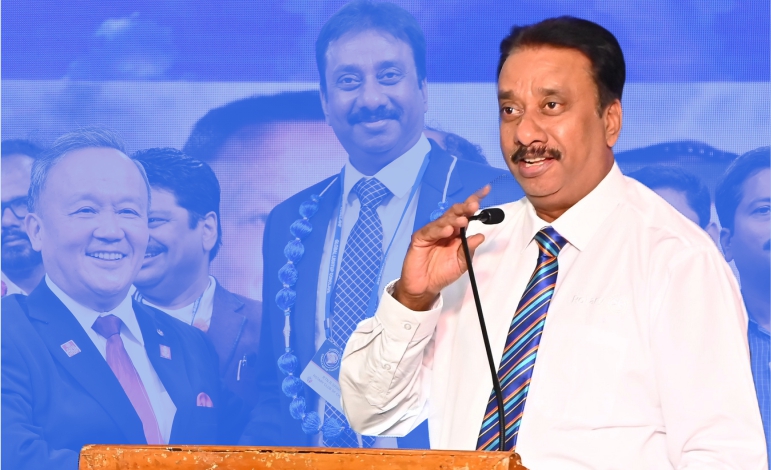
Your career path has been quite diverse, from medical research to brick kilns and hospitality. How has this variety of experiences contributed to your success in Rotary leadership?
My diverse career path has been instrumental in shaping my approach to Rotary leadership. Each transition taught me valuable lessons in adaptability, problem-solving, and understanding different perspectives. In medical research, I learned the importance of meticulous planning and attention to detail. The brick kiln business taught me about community engagement and the challenges faced by labourers. The hospitality industry honed my skills in service and customer satisfaction. All these experiences have given me a unique perspective in Rotary, allowing me to approach projects and leadership roles with a multifaceted understanding of business, community needs, and service.
Can you tell us about the Transit School Project for children of migrant labourers? How did this initiative come about?
The Transit School Project for children of migrant labourers was a transformative initiative that truly embodied the spirit of Rotary. It all started when a past president asked me a thought-provoking question: ‘Srini, you are bringing all these labourers. They are coming with their children. Have you ever thought of their education?’ That question jolted me and sparked a vision.
We partnered with the Chief Educational Officer of Tiruvalluvar District to implement the Sarva Shiksha Abhiyan program. We set up transit schools in three places, initially using cattle sheds that we cleaned and converted into open schools. We provided midday meals at the Rotary Club’s cost.
The impact was immediate and heartwarming. We started with 600 children in the first year, and the number grew to 1000 in the second year. These children, who would otherwise have been idle or working, were now enjoying school, playing with other children, and most importantly, learning.
What made this project truly special was its focus on mainstreaming. After six months, we provided these children with migration certificates, allowing them to continue their education in their native places. Over the years, we saw the number of children needing these schools decrease – a sign of our success.
The most touching moment came when a mother approached me years later. Her daughter, who had started in our cattle shed school, had now passed 10th grade. It was then that I felt the true pride of being a Rotarian – we had made a real difference in a child’s life.
This project taught me that through Rotary, we can achieve what we might not as individual entrepreneurs. We not only educated these children but also instilled the importance of education in their parents. Today, those children are going to college and working.
The Transit School Project stands as a testament to what we can achieve when we identify a need in our community and take action. It’s not about the money spent, but about the lives changed and the future brightened for these children and their families.
Your tenure as Director of Membership Development saw significant growth. What strategies do you believe are most effective for attracting and retaining members?
Effective membership growth and retention require a multifaceted approach. First and foremost, it’s crucial to emphasize the advantages of being a Rotarian. I always focused on what one can gain from Rotary before discussing what they can give. Secondly, setting clear targets for club presidents and recognizing their achievements regularly, not just at year-end, keeps motivation high. I introduced star pins and club recognitions for inducting new members, which created healthy competition.
Another key strategy is conducting engaging orientation programs for new members. We held several Green Rotarian Orientation Seminars to ensure new members understood Rotary’s value.
Retention is equally important. Two critical factors for retention are “happiness” and “happenings” within the club. Members stay when they’re happy and when there’s always something happening, be it projects or social events. Lastly, consistent follow-up with membership chairs and presidents, along with streamlined reporting processes, ensures steady growth. It’s not just about numbers; it’s about creating an environment where members feel valued and engaged.
You’ve attended multiple International Conventions. How have these experiences shaped your perspective on Rotary’s global impact?
Attending International Conventions has been transformative in understanding Rotary’s true global reach and impact. These events are unlike any other — imagine 40,000 Rotarians from all corners of the world coming together, united by a shared commitment to service. The conventions offer a unique opportunity to witness the scale of Rotary’s projects worldwide. The House of Friendship, for instance, is an eye-opener where clubs and districts showcase their initiatives, allowing us to learn and potentially build partnerships.
These conventions also provide invaluable opportunities to connect with Rotary leadership, gain insights into the Foundation’s work, and understand how our local efforts contribute to the bigger picture. The cultural exchanges, inspiring speakers, and the sheer internationality of Rotary become tangible at these events. They’ve broadened my perspective, showing me that what we see at the district level is just the tip of the iceberg. I strongly encourage every Rotarian to attend at least 3-4 conventions in their lifetime. It rejuvenates your Rotary spirit and provides fresh inspiration for local and global service.
As a Major Donor to the Rotary Foundation and with all family members being Paul Harris Fellows, how do you view the role of personal philanthropy in achieving Rotary’s goals?
Personal philanthropy, particularly through the Rotary Foundation, is crucial in realizing Rotary’s ambitious goals. I believe in the concept of ‘dharma’ — where the beneficiary is unknown to the giver. When we contribute to the Foundation, our donations reach people we may never meet, but their blessings and goodwill come back to us. This form of giving is powerful and pure.
I’ve observed a direct correlation between my contributions to the Foundation and my business growth. It’s not just about the amount; it’s about the intention and consistency. Even a thousand dollars can make a significant impact. The Foundation ensures that our contributions are used wisely and effectively, maximizing the impact of every dollar donated.
Moreover, being a Major Donor sets an example for other Rotarians. It demonstrates our commitment to Rotary’s cause and encourages others to contribute. Personal philanthropy through Rotary allows us to be part of something bigger than ourselves, addressing global issues like disease prevention, water sanitation, and education. It’s a way to leave a lasting legacy and make the world a better place, embodying Rotary’s ideal of ‘Service Above Self’.
You organized a Rotary trip to South Africa to promote networking and friendship. How important are these international connections for Rotary’s mission?
The South Africa trip was a pivotal moment in fostering international connections. These global relationships are fundamental to Rotary’s mission of promoting international understanding and peace. By organizing visits to Rotary clubs in Durban and Johannesburg, we created opportunities for cultural exchange and project partnerships.
These international connections expand our perspective on global issues and how Rotary can address them. They allow for the exchange of ideas, best practices, and resources across borders. For instance, many clubs from our district formed sister club agreements with South African clubs, leading to collaborative projects and cultural exchanges.
Such connections also personalize Rotary’s international impact. When you meet Rotarians from different countries and see their projects firsthand, it reinforces the global nature of our organization and inspires us to think bigger in our service efforts.
Furthermore, these international friendships often lead to more effective and sustainable global grant projects. When clubs from different countries collaborate, they bring diverse expertise and resources, resulting in more impactful and innovative solutions to community challenges.
I encourage all Rotarians to seek out these international connections, whether through convention attendance, friendship exchanges, or partnering on global projects. It’s these relationships that truly embody Rotary’s international spirit and drive our global impact.
Balancing a successful business career with extensive Rotary involvement can be challenging. What advice would you give to young professionals in this regard?
Balancing a successful career with Rotary involvement is indeed challenging, but it’s also incredibly rewarding. The key lies in effective time management and prioritization. Many people claim they don’t have enough time, but in reality, we all have the same 24 hours — it’s how we use them that matters.
My advice to young professionals is to first shed the excuse of “not having enough time.” Instead, focus on prioritizing and practicing time management. Rotary, particularly when you take on leadership roles like club president, teaches you invaluable skills in planning, execution, and leadership that directly benefit your professional life.
I’ve found that the skills you develop in Rotary — such as public speaking, project management, and networking — are directly applicable to business success. Moreover, the connections you make in Rotary can open doors in your professional life.
It’s also crucial to involve your family in your Rotary journey. When they understand the importance and impact of your Rotary work, they become supportive partners in your service efforts.
Remember, successful Rotarians and business leaders are those who can effectively manage their time across family, business, and Rotary commitments. It’s not about finding time; it’s about making time for what’s important. The discipline and skills you develop in balancing these aspects will make you more effective in all areas of your life.
Lastly, don’t view Rotary as a time consumer, but as a tool for personal and professional growth. The leadership experience, networking opportunities, and sense of purpose you gain from Rotary are invaluable assets in your professional journey.
Throughout your Rotary journey, you’ve held numerous leadership positions. Which role had the most profound impact on your personal growth, and why?
Without a doubt, the role of Club President had the most profound impact on my personal growth. It’s often overlooked in favour of district-level positions, but I believe it’s the most crucial leadership role in Rotary. As Club President, you’re at the forefront of Rotary’s work, directly involved in project implementation and member engagement.
This role taught me the essentials of leadership — planning, time management, team building, and effective communication. It’s your first opportunity to transition from being a team member to a team leader, a shift that’s invaluable in both Rotary and business contexts.
The Club Presidency challenges you to balance diverse personalities, manage resources effectively, and inspire your team towards a common goal. It’s a role that pushes you out of your comfort zone, forcing you to develop skills you might not have known you had.
What makes it particularly impactful is the immediacy of your actions. You see the direct results of your decisions and leadership, whether it’s in successful projects, membership growth, or improved club dynamics. This immediate feedback loop is incredibly valuable for personal growth.
Moreover, the Club Presidency instils a sense of responsibility and pride. You become the flag bearer of your club, representing it at various forums. This experience builds confidence and hones your public speaking and networking skills.
Even now, years after my term as District Governor, the memories and lessons from my Club Presidency remain vivid and influential. It laid the foundation for all my future roles in Rotary and significantly contributed to my growth as a leader in my professional life as well.
How has your involvement in Rotary influenced your approach to business and personal life?
Rotary has profoundly influenced both my business approach and personal life. In business, Rotary taught me the importance of ethical practices and the value of networking. The Four-Way Test, a cornerstone of Rotary ethics, has become a guiding principle in my business decisions. It’s taught me to consider the wider impact of my actions, not just on profits, but on people and communities.
The networking aspect of Rotary has opened numerous doors in my professional life. The diverse connections I’ve made through Rotary have led to business opportunities and partnerships I might never have encountered otherwise.
Personally, Rotary has instilled in me a deeper sense of empathy and global awareness. Participating in community service projects and international initiatives has broadened my perspective, making me more conscious of global issues and my potential to contribute to solutions.
Rotary has also honed my leadership and communication skills. The experience of leading diverse teams in Rotary projects has directly translated to more effective leadership in my business.
Perhaps most importantly, Rotary has given my life a greater sense of purpose. The satisfaction derived from service projects and the impact we make in communities is unparalleled. It’s made me realize that success isn’t just about personal achievements, but about the positive difference we can make in others’ lives.
Can you share a challenging moment in your Rotary journey and how you overcame it?
As the International Services Chairman, I took on the challenge of organizing international nights and connecting Rotary with various consulates in Chennai. It was a ground breaking initiative, and I’m proud to say we achieved remarkable success.
We started with the Thai consulate, and our first Thai night was an outstanding success. We planned for 200 people, but close to 400 attended. Building on this momentum, we organized German night, Japanese night, US night, and Malaysia night. In total, I orchestrated almost 8-9 international nights.
The US consulate was particularly challenging. They gave me nearly 200 questions to answer, but I persevered. My efforts paid off when the deputy consul general attended our event. I seized this opportunity to advocate for easier visa processes for Rotarians.
As a result, we established a significant agreement: whenever there’s a Rotary stamp and a governor’s letter confirming attendance at a Rotary convention, visa applications would be prioritized. This was a game-changer for our members traveling to the USA for Rotary events.
We didn’t stop there. I even organized an India night in South Africa, fostering sister club agreements between South African and Indian clubs. This initiative created lasting international connections for many of our clubs.
Through these efforts, we elevated Rotary’s status with the consulates. We demonstrated that Rotary in our part of the world is stronger, bigger, better, and bolder. We created a pathway for consulates to assist Rotarians with business ventures in their countries.
In the end, we didn’t just overcome a challenge – we turned it into a series of achievements that strengthened Rotary’s international relationships and benefited our members in tangible ways.
What advice would you give to Rotarians aspiring to take on leadership roles within the organization?
For Rotarians aspiring to leadership roles, my first piece of advice is to start at the club level. Take on responsibilities within your club, such as heading a committee or leading a project. These experiences are invaluable in understanding the grassroots functioning of Rotary.
Secondly, focus on developing a deep understanding of Rotary’s core values, structure, and global initiatives. Attend district events, participate in multi-club projects, and if possible, go to international conventions. These experiences will broaden your perspective and network.
It’s crucial to be a team player. Rotary leadership is about collaboration and consensus-building. Learn to listen to diverse opinions and work towards common goals. Develop your skills in conflict resolution and diplomacy — these are essential in leadership roles.
Take advantage of Rotary’s leadership development programs. Participate in Rotary Leadership Institute (RLI) courses and other training opportunities offered by your district or zone.
Be innovative and open to new ideas. Rotary values leaders who can bring fresh perspectives while respecting its traditions. Don’t be afraid to propose new initiatives or ways of doing things.
Cultivate mentorship relationships. Seek guidance from experienced Rotary leaders and offer mentorship to newer members. These relationships are mutually beneficial and help in personal and professional growth.
Lastly, remember that leadership in Rotary is about service. Your goal should be to enhance Rotary’s impact and support your fellow Rotarians, not personal glory. Stay humble, be willing to learn from others, and always keep the bigger picture of Rotary’s mission in mind.
Leadership roles in Rotary are demanding but incredibly rewarding. They offer unparalleled opportunities for personal growth, networking, and making a positive impact on a global scale.
